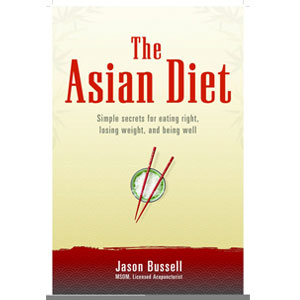Jason Bussell is an acupuncturist and herbalist. He earned his Masters of Science in Oriental Medicine at the Midwest College of Oriental Medicine and his PhD in Acupuncture at the Guangzhou University of Chinese Medicine. He is President Emeritus of the Illinois Association of Acupuncture and Oriental Medicine; and is a Board Member on the Illinois State Government Board of Acupuncture.
 Dr. Bussell founded A Center for Oriental Medicine in Wilmette, Illinois; lectures regularly to medical personnel and the public locally and internationally; and has written articles for Eastern and Western Medical publications. His book, The Asian Diet: Simple secrets for eating right, losing weight, and being well was published by Findhorn Press and is available worldwide.
Dr. Bussell founded A Center for Oriental Medicine in Wilmette, Illinois; lectures regularly to medical personnel and the public locally and internationally; and has written articles for Eastern and Western Medical publications. His book, The Asian Diet: Simple secrets for eating right, losing weight, and being well was published by Findhorn Press and is available worldwide.
1. Why is your book called “The Asian Diet” and what inspired you to write it?
If we eat like the Asians, we will look like the Asians (skinny). When they eat like us, they look like us (not so skinny). This doesn’t mean you have to eat Chinese food every day. The different cultures of Asia eat very different cuisines, but they all adhere to the same principles. And their dietary habits have served them well.
In Chinese medicine, we are always trying to find the root cause of disease or disorder. If you are living out of balance, acupuncture and herbs can help temporarily, but your body will continue to give you messages (symptoms) telling you that you should make some modifications. The three greatest factors that get us out of balance are our Diet, Lifestyle, and Attitudes. With all of my patients, I go over the Chinese recommendations for bringing these three areas into balance. After hearing all this, many patients would ask me, “Where can I get this in a written form?” I searched for a book to recommend but was unable to find one, so I wrote mine. It is called “The Asian Diet” but it is actually about the Asian diet, lifestyle and attitudes recommendations.
2. Tell us some important Asian principles that convinced you to share the knowledge about the Asian Diets?
The overriding principles in Asian culture for promoting health are: Balance and Moderation. In America, ours is an extreme culture. And this is reflected in our diet programs. For example, the Sugar Buster’s diet says to avoid All sugar, the Grapefruit diet says to eat grapefruit EVERY day, Atkins says to eat meat ALL the time, the vegan diet says NEVER eat ANY animal products. None of these extreme diets are good for the long-term.
Also, in Asia, they recognize the connection between what we put in our bodies and how they function. One of the Father’s of Chinese Medicine, Sun Si Miao, wrote that “In cases of disease and disorder, the physician should first address the diet and lifestyle.” Hippocrates, the father of Western Medicine said “let your food be your medicine and let your medicine be your food”. But now in America, we see food as a generic fuel and don’t pay enough attention to how we are nourishing ourselves. I see our public health as being in a state of crisis and wanted to empower Americans with this knowledge so they can improve their health with these simple principles.
3. Your book teaches about balance and moderation, how does this help people who want to lose weight?
We literally are what we eat. Every day, millions of our cells die. And we make new cells out of the raw material (food) that we put in us. If you were going to build a house, you would probably want to get the best quality lumber you could find. This same principle applies to our bodies. The first objective of the book is to raise awareness of the importance of our dietary choices.
A good diet is like a good stock-portfolio- diversified. If we are eating the same thing every day or every week, then we are loading up in one sector. This makes us more prone to the dangers of that sector; and at the same time we are missing out on all other other good things happening in the market. So one of the easiest and best things we can do to improve our diet is to increase the variety of foods that we eat. If you are doing the same thing every day, it is impossible to be moderate. If you are doing a wide variety of things, it is impossible to NOT be balanced.
Again, it’s all about balance and moderation. Obesity is a symptom of an imbalance. If we live more in balance and eat more in balance, that symptom will naturally go away.
4. Can you tell us what are the differences between the Standard American Diet and the Asian Diet?
The main principles of The Asian Diet are to eat a wide variety of foods, mostly vegetables, mostly cooked (salads are not good for weight loss), mostly natural, whole grains (except white rice which is better than brown in some ways), some fruit, a little bit of meat, little to no dairy, and green tea as a staple beverage.
The Standard American Diet is to eat a lot of processed foods; too much meat (or too little); a small variety of vegetables that are often uncooked; a lot of dairy, and coffee and sodas as staple beverages. All of these contribute to obesity and poor health.
5. What are your thoughts about the causes of obesity, diabetes, stroke, and cancer in America?
I have a friend who studies Epidimiology or the origin of disease. She told me that as she was researching her Master’s thesis, she could not find a preventable disease that did not relate to diet. Obesity is directly related to our poor diet, but it is also connected to our lifestyle and attitudes. We don’t move enough and we stress out too much. Diabetes, stroke, cancer, and most diseases can be promoted by improper diet, lifestyle, and attitudes. Therefore, improving these areas can prevent these diseases.
6. Besides losing weight, what other benefits should a person expect to derive following “The Asian Diet”? Is it for everyone?
This book is not about losing weight. It is about living in balance. Obesity is one type of imbalance, but it is not the only one. I have many patients who are not overweight but are terribly out of balance. Chinese Medicine sees all disease as a manifestation of an inner imbalance. Therefore, following the recommendations in the book can effect improvements in all areas of functioning- such as sleep, skin, digestion, mood, libido, energy, and more. With very few exceptions, everybody could benefit from adopting the principles of The Asian Diet.
7. If we follow the principles and strategies strictly, on average, how many pounds can be expect to shed? What is the one thing that helps dieters to lose weight?
Like I say, this is not a program for losing weight specifically. It is not a quick fix. Quick fixes don’t work. We didn’t get fat overnight, we should not expect to get thin overnight either. If you adopt the principles of the Asian Diet, the pounds will naturally start falling off effortlessly. And they will continue to fall off until you reach the weight that you should maintain. There is no “one thing” that helps dieters to lose weight. Most of the diets that are promoted in our culture grossly oversimplify things. You need to improve the diet, lifestyle, and attitudes. The rate of weight loss will depend on how much you need to lose. But once you have this knowledge, it will be easy to make better choices and you won’t have to worry about losing weight, it will just happen.
8. What are the unique features that make ” The Asian Diet” different from other diet books and what are the main features that account for your successful results?
The Asian Diet is a sustainable plan. It is balanced and can serve you for the rest of your life. And it is a gentle plan. I recommend slow and gentle change. Changing too much too quickly sets us up to fail and shocks our system. It is not a rigid regimen either. There is no food that you must avoid. I want people to enjoy all the foods that they love; I just want them to have them in the right proportion.
The overwhelming feedback I have received is that the information in the book “just makes sense”. There are powerful forces that are mis-educating us about food in order to sell us certain products. The book gives readers information. Armed with that, they make better choices naturally. It does not feel like work to follow this program.
9. What exercise or physical activities do you suggest that helps in losing weight from the Asian point of view and why?
Tai Chi is the best exercise. It can be done at any age and any level of fitness. It is considered a “qi cultivation” tool. (Qi loosely translates as “vital energy”). All other exercises consume our energy; Tai Chi can give us more energy than we had to begin with. Also, it is an internal and external martial art. That means that it pays as much attention to bringing the heart and mind into harmony as it pays to the body. Yoga can be as good as Tai Chi, but every year I get 10-15 yoga-related injuries in my practice; and I have never seen one Tai Chi-related injury. Swimming and walking briskly are great. All other exercises should be in a wide rotation. We have 600+ muscles in our bodies. They all want attention and they all want different kinds of attention. So this is another area where we must practice balance and moderation. If you are doing too much of one thing, then you are doing too little of everything else.
10. As there are readers and subscribers who are struggling to lose weight to help them shed the fats, do you have anything specific or advice that you want to say for them?
I hate to sound like I am shilling for book sales, but I suggest they read my book. You don’t have to buy it, get it from the library. If your library doesn’t have it, ask them to order it. The advice is simple and easy to follow. Most people read it in one or two days. But if you want the highlights: increase the variety of (natural) food that you consume; eat more (cooked) vegetables; get away from processed and unnatural foods (including sugar substitutes); decrease your dairy intake; get a little exercise most days; and stop stressing about all the little things in life.

Leave a Reply